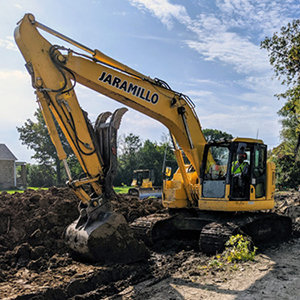Comprehensive Excavation Techniques: Mastering the Fundamentals for Success
In the world of construction and civil design, the significance of efficient excavation approaches can not be overemphasized. The careful planning, exact implementation, and thorough interest to information needed in excavation tasks require an extensive method that encompasses different fundamental aspects. From initial soil analysis to the execution of safety steps and regular progression surveillance, grasping these core components is important for achieving success in any type of excavation undertaking. Nonetheless, truth mastery lies not merely in comprehending these fundamentals but in perfectly integrating them to browse the intricacies of excavation tasks with skill.
Understanding Excavation Job Planning

Effective excavation projects are improved the structure of meticulous and detailed preparation. The preliminary stage of any type of excavation task is the planning stage, where important decisions are made that can significantly affect the outcome of the project. During this stage, it is necessary to gather all appropriate information regarding the website, including topographical studies, soil make-up, and any type of potential risks that may exist. Recognizing the job spending plan, timeline, and extent restraints is important for creating a detailed excavation strategy that ensures the project's success.
One trick element of excavation project planning is the advancement of a comprehensive timeline that outlines the series of activities, deadlines, and landmarks. By very carefully taking into consideration all these elements throughout the planning phase, excavation projects can be executed successfully and successfully, leading to effective results - lancaster excavation.
Soil Analysis and Website Examination
Conducting detailed soil analysis and website assessment is a critical action in the prep work phase of any kind of excavation project. Soil evaluation entails establishing the structure, framework, and homes of the dirt at the excavation website. This info is crucial for understanding the soil's bearing capability, dampness content, and possibility for disintegration, which are key consider figuring out the excavation methods and devices required for the task.
Site assessment goes beyond soil analysis and encompasses a wider evaluation of the overall site conditions. This evaluation includes determining any kind of possible threats, such as below ground energies, ecological problems, or unpredictable terrain, that can influence the excavation process. By thoroughly reviewing the website, task supervisors can create reliable excavation approaches that focus on safety and security, performance, and ecological defense.
Using sophisticated innovations like ground-penetrating radar, soil sampling, and drone studies can enhance the precision and effectiveness of soil analysis and website examination. Investing time and resources in these preliminary actions can inevitably conserve time and stop expensive delays or problems throughout the excavation process.
Tools Choice and Use
Efficient excavation tasks depend greatly on strategic equipment option and usage to ensure ideal efficiency and performance. Choosing the right equipment for the job is essential in making best use of effectiveness and lessening downtime. Elements such as the kind of dirt, depth of excavation, and task scope play a significant duty in identifying one of the most ideal equipment for the job handy.

Along with selecting the suitable devices, appropriate utilization is vital to project success. Operators must be trained to handle the devices safely and efficiently - dump truck companies in ohio. Normal upkeep checks and timely repair services help protect against failures and make certain regular performance throughout the job
Precaution and Laws Conformity
In the world of excavation jobs, prioritizing safety measures and conformity with regulations is paramount to ensuring a legitimately audio and protected operational atmosphere. Security steps encompass a variety of methods, including conducting extensive site analyses, executing proper signage and obstacles, and offering adequate security training for all workers associated with the excavation process. Adherence to policies, such as OSHA demands in the United States, guarantees that the excavation task satisfies the necessary standards to secure workers, spectators, and the surrounding environment.

Monitoring Development and Adjusting Methods
Exactly how can project managers efficiently track the development of excavation projects and adjust their methods accordingly to maximize results? Surveillance progression is crucial for making certain that excavation jobs stay on visit our website track and satisfy due dates. Project supervisors can use different devices and techniques to track development, such as daily report card, normal site inspections, and progressed tracking innovations like drones and general practitioners tracking systems. By continuously checking the task's development, supervisors can determine any type of potential hold-ups or issues at an early stage and take aggressive steps to address them.

Final Thought
To conclude, grasping the basics of comprehensive excavation approaches is crucial for the success of any task. By recognizing job planning, assessing soil and website problems, picking appropriate tools, abiding by security policies, and monitoring progression, task supervisors can make sure a smooth and effective excavation procedure. Executing these approaches will certainly result in effective outcomes and lessen potential dangers or setbacks throughout the excavation project.
The preliminary phase of any excavation project is the preparation stage, where essential decisions are made that can significantly impact the result of the task. Understanding the task budget plan, extent, and timeline restrictions is crucial for producing a detailed excavation strategy that makes sure the project's success.
Exactly more helpful hints how can forecast managers effectively track the advancement of excavation jobs and adjust their approaches accordingly to enhance outcomes? By closely checking progression and being willing to adapt strategies, task supervisors can boost the total success Recommended Reading of excavation tasks.
By understanding project preparation, examining dirt and website problems, picking suitable tools, complying with security guidelines, and checking progression, task managers can guarantee a smooth and efficient excavation process.